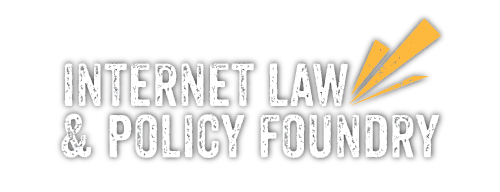PRESS RELEASE: The Internet Law & Policy Foundry Welcomes its Fifth Class of Fellows
The Inaugural Junior Fellows Join a Growing Global Community of Early-Career Professionals in Internet Law and Policy
Washington, D.C. — Today, the Internet Law & Policy Foundry (The Foundry), a professional development organization composed of early-career professionals working across law, technology and policy welcomes its fifth class of fellows. The 30 individuals hai from technology companies, government, professional services firms and the nonprofit sector.
The fifth class represents The Foundry’s inaugural Junior Fellowship, a new structure at The Foundry where fellows gain experience running the Foundry alongside the current (fourth class) fellows.
“We’re excited to launch the Junior Fellowship. Our 2023 Class is the most selective cohort yet, with Fellows ranging in demographics, geography, ideology and skill sets,” said Tim Lordan, Executive Director at the Internet Education Foundation (IEF). “We look forward to seeing the fellows join Class Four to power even greater events and content creation for the technology, law and public policy communities.”
Launched by IEF in 2015, The Foundry is a collaborative organization for Internet law and policy professionals who are passionate about disruptive innovation. Foundry fellows work on critical issues facing the Internet law and policy space, including artificial intelligence, content moderation, cybersecurity, Internet access and privacy.
Fellows aim to foster a community of diverse voices that explore issues in the equitable development and governance of technology and the Internet through writing, network-building and constructive debate. Fellows hold their positions for two years — serving as Junior Fellows the first year and Senior Fellows the second.
To see the full list of fellows and learn more about the Foundry, visit the Fellow’s page and Foundry’s website.
ABOUT THE INTERNET LAW & POLICY FOUNDRY
The Internet Law & Policy Foundry (The Foundry) is a collaborative collection of early-career Internet law and policy professionals passionate about technology and disruptive innovation. The Foundry offers members a platform for professional development, constructive debate and network-building within a cohort of skilled Internet law and policy professionals.
As advocacy spending in technology policy grows and Internet companies become more sophisticated in dealing with legal and public policy issues, The Foundry was created to address the growing demand by early and mid-level law and policy professionals for opportunities to master a range of Internet policy issues and apply their knowledge. The Foundry has created a space where early professionals from a variety of disciplines and perspectives can develop their expertise and identify stimulating opportunities in the technology law and policy field.
CONTACT:
Lama Mohammed
###
Foundry Fellows // The 2023 Class



Angie Orejuela is a first-generation Honduran American passionate about studying the intersections of digital governance and diplomacy pertaining to developing countries. She is particularly interested in new technology’s socioeconomic impacts through policy implementation.


Chanel Cornett is a Counsel on the Trust & Safety team at Zoom. Prior to joining Zoom, Chanel was a Legal and Policy Officer at Fair Trials, where she worked on criminal justice reform policy. Before Fair Trials, she spent her first year post-law school graduation working for California Attorney General, Xavier Beccerra’s legal and policy advisory team.




Gabe Rudin is a J.D. Candidate at the University of Colorado Law School. He is interested in regulatory compliance, M+A, tech transactions, and the politics of cross-border data transfers.

Jacob (Jake) Odame-Baiden is a lawyer based in Ghana. He has vast experience in technology project management, legal advisory and regulatory and compliance for the technology consulting and telecommunication sectors in Ghana and other African countries.


Jérôme Nicolaï has served as Digital Economy Attaché at the Embassy of France to the United States since April 2021, where he is responsible for the economic department analysis on technology policy issues.

As Google’s Global Policy Lead for Law Enforcement and Government Access, Katelyn Ringrose works on all issues tied to data governance. Before her current position, Katelyn served as the Future of Privacy Forum’s Christopher Wolf Diversity Fellow — working on data privacy and security.

Katherine Wang is interested in privacy, surveillance and emerging technologies. She is a J.D. Candidate at UC Berkeley School of Law, where she leads Privacy Law at Berkeley and serves on the executive board of Berkeley Technology Law Journal, Coalition of Minorities in Technology Law, and Asian Pacific American Law Students Association.





Luisa is a Brazilian professional with a legal and corporate background based in Washington, D.C. She holds experience in creating and implementing data privacy programs that enable innovation while navigating data risks with pragmatic solutions.

Matt Furlow is currently Policy Director at the U.S. Chamber of Commerce’s Technology Engagement Center (C_TEC). He leads the portfolio on emerging technology issues, focusing on innovative transportation technologies, semiconductors and communications and Internet policy.

Matthew Ogbeifun manages policy stakeholder engagement for a Big Tech company, where he focuses on bringing together diverse perspectives to shape content and product policy development through structured and sustained engagement.







Sean Chen is the former Legal Fellow at the Wikimedia Foundation (Class of 2019 Fall and 2020 Spring, Summer Terms) after receiving his LL.M. degree from New York University School of Law in 2019, where his studies focused on Competition, Innovation, and Information Law. Prior to his graduate study at NYU Law, he obtained his first law degree from the Institute of Law for Science and Technology, National Tsing Hua University (Taiwan).


Zia Mohammad is a Senior Product Manager in Amazon’s Quantum Computing Group with an interest in helping shape the future of U.S. technology policy. His desire to bridge the fields of emerging tech and public policy is driven by his experiences in venture capital, quantum computing and artificial intelligence.

